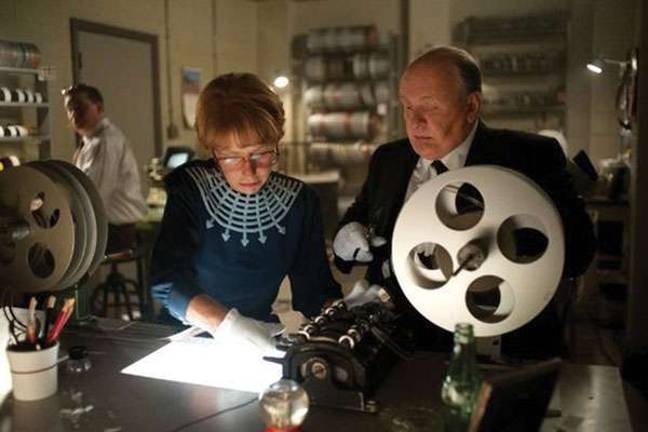City Arts: 'Hitchcock' is Myopic Bio-Pic

'Hitchcock' shows the maestro without humor Sacha Gervasi'sAnvil: The Story of Anvil, the 2010 chronicle of the little-known rock band, was a rare excellent documentary; a film distinguished by its good-hearted recognition of what lies beneath artistic motive. Only a little of that beneficence is apparent in Gervasi's dramatic debutHitchcock, which takes a fanciful approach to biography. Its problem isn't simply a lack of documentary veracity but the absence of good intention. InHitchcock, Gervasi seems to disbelieve the transformative, or at least extenuating conditions, of art-making. The film's scandal-based view of Alfred Hitchcock's personal eccentricities-his egotism, marital self-absorption and professional exploitation-overwhelm any appreciation that its subject is one of the 20th century's undeniable artists. It was in thefin de siècle wrap-up Histoire(s) du Cinemathat Jean-Luc Godard referred to Hitchcock as "the greatest poet of us all." Gervasi's film concerns the making of Hitchcock's 1960 masterpiecePsycho. Its dramatic and aesthetic shock came as the culmination of a fantastically successful career in England and Hollywood. ButPsychowasn't just a career move following the popularity ofNorth by Northwest.Psychoaltered the culture, as much a revolutionary moment asBattleship PotemkinorCitizen Kane-two movies that rivaled Hitchcock's extraordinary use of montage and mise-en-scène. Because no one was prepared for Hitchcock's gear-shift at the time doesn't excuse Gervasi's indifference to the fact. His movie is completely vacant of a sense of period-that unsuspected transition from post-WWII affluence and Western confidence to an era of fearful change, suspicion, brutality and cynical, inbred violence. Arriving on the cusp of social revolution, Hitchcock'sPsychoushered in new perspectives on cinema and popular art. It was surprisingly coincidental with experimentation of European film artists as well as the investigation of unrefined genres begun by Orson Welles'Touch of Eviland continued with Michael Powell'sPeeping Tom-but outclassing both and later surpassing himself with the pinnacle achievement ofThe Birds. This film's recounting of the great moment is too comfortable with the banality of the maestro's mundane domestic life with wife Alma Reville, a former colleague and creative partner. And of the Hollywood system, treating Hitchcock as a pampered child among the lunatics in the studio system's asylum. Hitchcock fantasizes conspiring with Ed Gein, the real-life serial killer upon whom the bookPsychowas based. These scenes parody the Hollywood religion of psychoanalysis?a perhaps too subtle joke. Gervasi has not achieved the knd of satire that, say, Joe Dante might have successfully brought to a fond reminisence ofPsychoand its discontents. (Recall Dante's 1993Matinee) Thankfully, this film is nowhere as hateful-or incompetent-as the recent HBO movieThe Girl, which wallowed in malicious rumor about Hitchcock's relationship with Tippi Hedren. As the killer-sympathizing, pun-telling, insecure maestro,Anthony Hopkins gets the Hitchcock voice right but his makeup is physically disastrous. Recalling Frank Langella playing Richard Nixon as Bela Lugosi, Hopkins plays Hitchcock like he did Nixon. Helen Mirren's Alma is a glorified lady-who-lunches, shops, swims and has an outburst of wifely anger no less hilariously overscaled than Beatrice Straight's inNetwork. Sometimes Gervasi's sense of humor shows when Hitchcock enters and exits the frame like a Goodyear blimp, recalling the famous rotund silhouette of hisAlfred Hitchcock PresentsTV icon. And the impersonations of Janet Leigh, Vera Miles and Anthony Perkins by Scarlett Johansson, Jessica Biel and James D'Arcy are uncannily buoyant and generous. Their suggestion that the making ofPsychowas a Hollywood comedy was a fecund idea that got lost. When Hitchcock was interviewed by Dick Cavett in 1972, he often stared him down, mischief hidden by gentlemanly deadpan, mirth underneath. Too bad Gervasi missed that authentic distinctive quality. Follow Armond White on Twitter at[3xchair](https://www.twitter.com/3xchair)